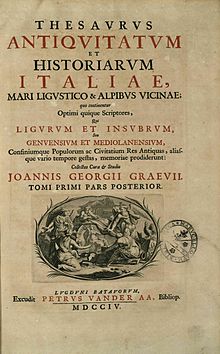Johann Georg Graevius
Johann Georg Graevius (Latinized from Grava or Greffe ) (born January 29, 1632 in Naumburg (Saale) , † January 11, 1703 in Utrecht ) was a German classical philologist and text critic .
Life
Originally intended as a lawyer, he made the acquaintance of Johann Friedrich Gronovius on a visit to Deventer , under whose influence he left law and switched to philology. He finished his studies with Daniel Heinsius at the University of Leiden and with the Protestant theologians A. More and David Blondel in Amsterdam .
During his stay in Amsterdam he converted - now under Blondel's influence - from Lutheranism to the Reformed Church ; In 1656 he was appointed to the chair of rhetoric at the University of Duisburg by Elector Friedrich Wilhelm von Brandenburg . Two years later, on the recommendation of Gronovius, he was appointed to the chair of Gronovius at the grammar school in Deventer ; In 1662 he was transferred to the University of Utrecht , where he was first given the professorship in rhetoric and then in 1667 that of history and politics, which he held until his death.
Graevius enjoyed a very good reputation as a teacher, his lecture room was overrun with students, many of them from noble families and from all over the world. He was honored by King Louis XIV of France and enjoyed the special favor of King Wilhelm III. of England , who made him a royal historian. He also took part in the organizational tasks of the Utrecht University and was rector of the Alma Mater in 1667/68, 1680/81, 1690/91 and 1700/01 .
His two most important works are the Thesaurus antiquitatum Romanarum (1694–1699, in 12 volumes), and the Thesaurus antiquitatum et historiarum Italiae , which was published after his death and continued by Pieter Burman the Elder (1704–1725). His editions of the classics, although they mark a significant advance in research, are largely out of date today. These include: Hesiod (1667), Lucianus , Pseudosophisla (1668), Junianus Justinus , Historiae Philippicae (1669), Suetonius (1672), Catullus , Tibullus et propertius (1680) as well as various works by Cicero - his best work.
Works (selection)
- Hesiodi Ascraei quae extant. Amsterdam 1667
- Justinus. Utrecht 1668
- Suetonius. Utrecht 1672
- Ciceronis Epistolarum libri XVI ad Familiares. Amst. 1677
- Catullus, Tibullus et propertius. Utrecht 1680
- Florus. Utrecht 1680
- Ciceronis Epistolarum libri XIV ad Atticum. Amsterdam 1684
- Ciceronis De officiis libri III, Cato Maior, Laelius, Paradoxa, Somnium Scipionis. Amsterdam 1688
- Ciceronis orationes. Amsterdam 1699
- Thesaurus Antiquitatum Romanarum XII dln. f .; Ultraj. Utrecht 1694–1699 ( index )
literature
- The Oratio funebris by Pieter Burman (1703) contains a detailed list of his works
- PH Kulb: Gräve, Johann Georg. In. Er - Gruber : General Encyclopedia of Sciences and Arts . 1. Sect., Vol. 78, p. 97
- John Edwin Sandys : History of Classical Scholarship . 1908, vol. 2, p. 327 and others (English)
- Karl Felix Halm : Gräve, Johann Georg . In: Allgemeine Deutsche Biographie (ADB). Volume 9, Duncker & Humblot, Leipzig 1879, p. 612 f.
- Abraham Jacob van der Aa : Biographical woordenboek der Nederlanden, bevattende levensbeschrijvingen van zoodanige people, who zich op eenigerlei wijze in ons vaderland vermaard made. Verlag JJ Van Brederode, Haarlem, 1862, vol. 7, p. 353, ( online , Dutch)
- Kan: Graevius, Joannes Georgius . In: Petrus Johannes Blok, Philipp Christiaan Molhuysen: Nieuw Nederlands Biografisch Woordenboek. (NNBW) Instituut voor Nederlandse Geschiedenis (ING), AW Sijthoff, Leiden, 1921, vol. 5, col. 949, (Dutch)
Web links
- Literature by and about Johann Georg Graevius in the catalog of the German National Library
- Works by and about Johann Georg Graevius in the German Digital Library
- Publications by and about Johann Georg Graevius in VD 17 .
- Works at the Munich digitization center
- Copper engraving
- Literature about Joannes Georgius Graevius in the Digital Library of the Netherlands (DBNL)
- Catalogus Professorum Academiae Rheno-Traiectinae
| personal data | |
|---|---|
| SURNAME | Graevius, Johann Georg |
| BRIEF DESCRIPTION | German classical philologist and text critic |
| DATE OF BIRTH | January 29, 1632 |
| PLACE OF BIRTH | Naumburg (Saale) |
| DATE OF DEATH | January 11, 1703 |
| Place of death | Utrecht |

